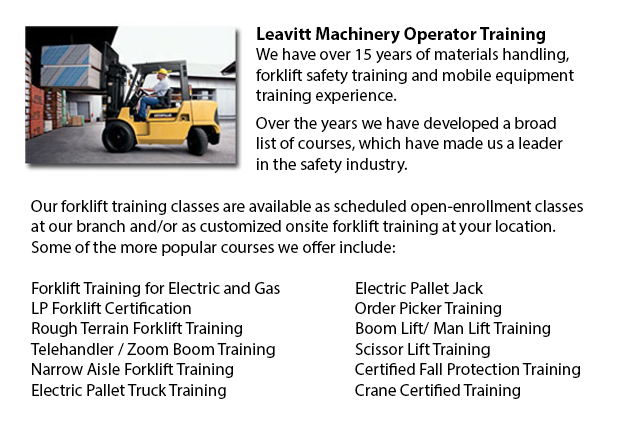
Richmond Hill Forklift License - Within North America, getting forklift certification or a forklift license involves classroom and hands-on training. Regulatory control over certification, training and license for powered industrial truck operators falls under the jurisdiction of state, provincial and federal groups. Operators could obtain a license either through training administered by the employer or by a third party. In any case, regulatory requirements have to be met. Recertification is required every two to three years.
The lift truck is a powered industrial machinery that is designed with different options, such as sit-down and stand-up models, propane and electric versions, and various sizes and types to meet the industrial requirements of employees. Operator training courses are usually individualized to be able address the certain types and uses for which the operator is training. Training on a gas-powered, sit-down lift truck in a warehouse surroundings would not be the same as training on a propane-powered, stand-up forklift within a shipyard. The variety of lift trucks and their uses makes it impossible to establish universal licensing requirements for all machinery and industries. Regulatory standards, thus, tend not to concentrate on detailed course requirements but instead on the results of individual training courses.
On the job training that is supplied by the employer is the most common form of forklift training licensing and certification. The employer who provides this method of certification is required to provide practical training and classroom sessions on equipment at their place of work. Employers could choose to train personnel on each and every type of forklift separately, or to train them on all machines combined. The course incorporates lift truck operation methods, company regulations, forklift maintenance and safety measures. Topics specific to the worksite, such as hazardous conditions or materials, should be included. Following classroom learning, operators are taught how to safely utilize and operate each kind of lift truck on the worksite.
Certification through a third-party vendor generally needs an on-site component along with hands-on practice.
It should be noted that employer-provided certifications do not transfer from one employer to the next. Acquiring a forklift license through employer-provided training allows the operator to run a lift truck for that employer only.
The most significant aspect of forklift license training is forklift safety. The exact safety training requirements vary from one kind of equipment to another. Safety problems differ from employer to employer, and from industry to industry. Both employer-provided training and third-party providers may have to deal with additional requirements for safety training in applicable businesses, like for example in offshore and marine operations.
-
Richmond Hill Manlift Operator Training
Richmond Hill Manlift Operator Training - The aerial lift or manlift is a specialized type of hydraulic platform that is meant to lift an individual vertically giving it an alternate name of a vertical personnel lift. These machines are widely used f... More -
Richmond Hill Boom Lift Training
Richmond Hill Boom Lift Training - Aerial platforms or likewise known as elevated work platforms are devices that enable workers to perform tasks and duties at elevated heights which would not be otherwise accessible. There are a variety of aerial li... More -
Richmond Hill Overhead Crane Safety Training
Richmond Hill Overhead Crane Safety Training - Overhead crane safety training equips operators with knowledge and skills about crane safety measures, accident avoidance, materials handling, and machinery and stock protection. Trainees will learn the... More -
Richmond Hill Heavy Equipment License
Richmond Hill Heavy Equipment License - A heavy equipment license could be acquired by taking a certification and preparation course at a private training school or a vocational school. This license would qualify you to operate many kinds of heavy ma... More -
Richmond Hill Manlift Training
Richmond Hill Manlift Training - Various manlift training programs consist of the review and content of manlift devices. An important part of the program is the practicum where students show their knowledge and practical ability to safely operate a m... More -
Aerial Lift / Boom Lift / Man Lift / Scissor Lift Training in Richmond Hill
Scissor platform lifts are forklift tables that elevate things and individuals and goods vertically. They are often used in industrial, construction and commercial environments. A common use of scissor platform lifts is for lowering or lifting constr... More -
Richmond Hill Scissor Lift Safety Training
Richmond Hill Scissor Lift Safety Training - A scissor lift is a kind of platform lift that moves vertically. The lift table is moved in a vertical motion because of criss-cross folding supports which are linked in what is known as a pantograph. The... More -
Richmond Hill Heavy Equipment Training
Richmond Hill Heavy Equipment Training - The two most common types of heavy equipment training are classed into the categories of equipment; machines which is fashioned with tracks and those with rubber tires. The tracked vehicle are heavy duty machi... More

Forklift Certification Richmond Hill
TOLL FREE: 1-888-254-6157
Richmond Hill, Ontario
forkliftcertificationrichmondhill.com
Email Us
About Us


